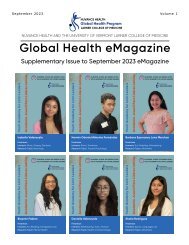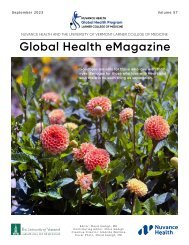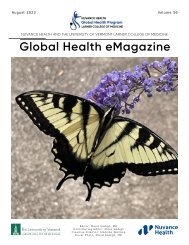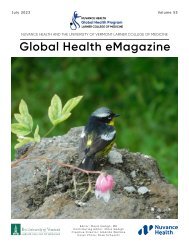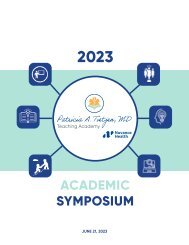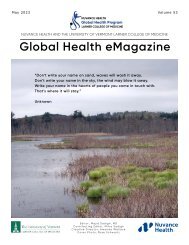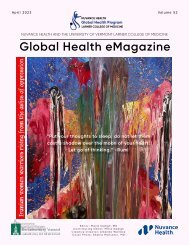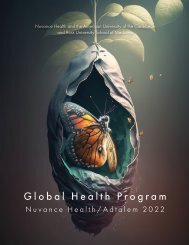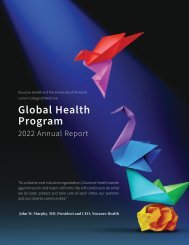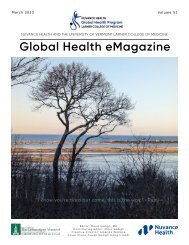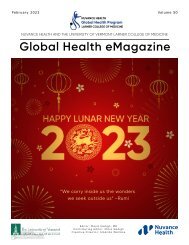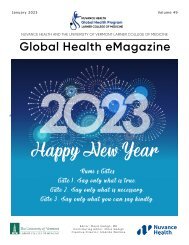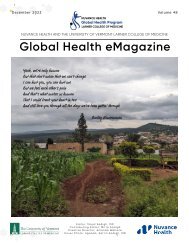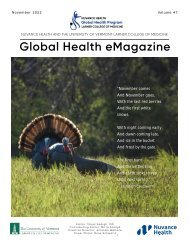eMagazine June 2023
You also want an ePaper? Increase the reach of your titles
YUMPU automatically turns print PDFs into web optimized ePapers that Google loves.
OUR PEOPLE,<br />
OUR MISSION<br />
The Voice of<br />
Ugandan Students<br />
Global Health<br />
<strong>eMagazine</strong><br />
<strong>June</strong> <strong>2023</strong><br />
Section Editor: Joshua Matusuko<br />
COLONISATION AND DECOLONISATION OF GLOBAL<br />
HEALTH CURRICULUM AMONG MEDICAL SCHOOLS IN<br />
UGANDA<br />
Written by Joshua Matusuko<br />
Medical student at MaKCHS<br />
Perspective<br />
Global Health Academy<br />
Highlights<br />
Reflections<br />
Welcome<br />
Global Local<br />
Hispanic and Latinx Communities<br />
Voices of Ugandan Students<br />
Global Health Mental Health<br />
Art to Rwmind Us of Who We Can Be<br />
Our Beautiful Planet<br />
Innovation and Technology<br />
Nursing Division<br />
Women’s Health Education<br />
Colonization continues to have a long-term significant impact on<br />
health systems, global health education, and healthcare practices in<br />
many countries that were colonies not long ago, including Uganda.<br />
Of the many influences that colonialism continues to have in healthcare, a colonial mindset<br />
among medical students and health workers in low and middle-income countries (LMICs)<br />
stands out to be the most significant to date. This issue makes it challenging to find long- and<br />
short-term solutions to the continued home health problems and inequalities that still plague<br />
many communities, despite possessing richness in numerous other resources. New physicians<br />
are often ill-equipped to address the true causes of health disparities, which are deeply rooted<br />
in historical, social, and political contexts. The current global health education curriculum<br />
in Ugandan medical schools fails to adequately discuss issues related to colonization and<br />
decolonization, which are crucial for understanding these health disparities. As a result, medical<br />
students in Uganda lack the knowledge and skills necessary to critically analyze the impact of<br />
colonialism on healthcare, to recognize its ongoing effects, and to work towards decolonizing<br />
medical practices. Additionally, they lack the skills to effectively navigate the complexities of<br />
global health, perpetuating the inequities in the healthcare system stemming from the gap in<br />
their medical curriculum.<br />
While numerous efforts have been made to decolonize global health education and improve<br />
health outcomes, there remains a colonial mentality among most of medical students in Uganda<br />
and in other LMICs—so even if advocates push for structural changes and power balances, by<br />
not tackling the core issue, which is mentality and mindset, we risk wasting most of our efforts.<br />
There is still a significant knowledge gap in global health curricula regarding colonization and<br />
decolonization in Ugandan medical schools, making it necessary to introduce this education at<br />
MakCHS and other institutions. Closing the knowledge gap will help fight the colonial mindset<br />
and ensure that more healthcare professionals are empowered to address the long-standing<br />
legacies of colonialism, improving the health of all.<br />
Among the Letters<br />
Announcements<br />
Article of the Month<br />
Video of the Month<br />
Congratulations<br />
Phoro News<br />
Calendar of Events<br />
Click here to visit the<br />
Nuvance Health Global<br />
Health Program<br />
COVID-19 Resource<br />
Center<br />
Resources<br />
20




